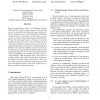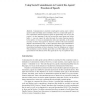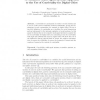115
Voted
CIMCA
2005
IEEE
15 years 8 months ago
2005
IEEE
Several methodologies based on Multi-agent Systems (MAS) already exist. They help designers to describe software or to create MAS which aim at solving complex problems by simulati...
150
Voted
ACOM
2006
Springer
15 years 8 months ago
2006
Springer
Communication is essential in multi-agent systems, since it allows agents to share knowledge and to coordinate. However, in open multi-agent systems, autonomous and heterogeneous a...
148
Voted
COMPSAC
2006
IEEE
15 years 8 months ago
2006
IEEE
The Sage development method and associated tool set support an incremental, iterative, model-driven process to build and maintain high assurance, reactive multi-agent systems. A s...
121
click to vote
KESAMSTA
2007
Springer
15 years 8 months ago
2007
Springer
Queueing Theory deals with problems where some restricted resource should be shared between competitive flow of requests. In this paper we use Queueing Theory methods to perform a...
124
Voted
EEMMAS
2007
Springer
15 years 8 months ago
2007
Springer
Although there is a huge amount of work and valuable proposals about agent oriented software engineering, it seems that the paradigm has not been fully accepted yet by software ind...
107
Voted
CCIA
2007
Springer
15 years 8 months ago
2007
Springer
Medical ontologies are developed to solve problems such as the demand for reusing, sharing and transmitting data. The unambiguous communication of complex and detailed medical conc...
125
Voted
ATAL
2007
Springer
15 years 8 months ago
2007
Springer
Conviviality is a mechanism to reinforce social cohesion and a tool to reduce mis-coordination between individuals, groups and institutions in web communities, for example in digit...
129
Voted
ATAL
2007
Springer
15 years 8 months ago
2007
Springer
Regret based algorithms have been proposed to control a wide variety of multi-agent systems. The appeal of regretbased algorithms is that (1) these algorithms are easily implement...
126
Voted
ATAL
2007
Springer
15 years 8 months ago
2007
Springer
Distributed Partially Observable Markov Decision Problems (Distributed POMDPs) are a popular approach for modeling multi-agent systems acting in uncertain domains. Given the signi...
112
Voted
AAMAS
2007
Springer
15 years 8 months ago
2007
Springer
Abstract. We study optimal control in large stochastic multi-agent systems in continuous space and time. We consider multi-agent systems where agents have independent dynamics with...



